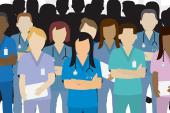What’s Going to Be Hot at ACC/WCC 2023?
The meeting, cohosted by the World Heart Federation, will have a “distinct international flavor” beyond the late-breaking fare.

Less than 2 weeks after Mardi Gras, the American College of Cardiology (ACC) Scientific Session is returning to New Orleans, LA, this year marching in step with the World Heart Federation’s World Congress of Cardiology (WCC). In addition to the regular parade of late-breaking clinical trials, this year’s joint ACC/WCC meeting will have a decidedly global flare.
ACC Scientific Session chair Douglas Drachman, MD (Massachusetts General Hospital, Boston), and vice chair Katie Berlacher, MD (University of Pittsburgh, PA), hosted a media telebriefing last month to preview this year’s meeting. According to Drachman, members of the World Heart Federation were heavily involved in the planning process for 2023, with the aim of broadening the scope.
“There really was a tremendous amount of international representation throughout the entire planning process with World Heart Federation members,” Drachman told reporters on the call. “Our focus on global health and [having] an international perspective therefore is truly baked into the entire conference. . . . I think as you attend ACC/WCC 23, you'll identify that there is a distinct international flavor that is really peppered throughout the entire meeting.”
Late-Breaking Science: Opening Showcase
Berlacher previewed the 43 late-breaking clinical trials (LBCTs) selected for this year’s meeting from a total of 146 submissions, half of which came from outside the United States. Noting that it was “really hard to choose my favorites,” Berlacher touched briefly on a handful of potentially practice-changing trials distributed across five sessions throughout the 3-day meeting.
The first batch of late-breakers will be released immediately after the opening session (Saturday, 9:30 AM CT) and feature three very different studies that she characterized as the “big hitters” of the meeting.
CLEAR Outcomes is the 14,000-patient, cardiovascular outcomes trial for the LDL-lowering agent bempedoic acid in patients who are statin-intolerant and have, or are at high risk for, cardiovascular disease. “I’m thrilled to hear what the outcomes will be for this really exciting trial,” Berlacher said.
Next in the opening showcase is TRILUMINATE, the randomized, pivotal trial for tricuspid edge-to-edge repair (TEER) with the TriClip (Abbott) versus optimal medical therapy in patients with severe tricuspid regurgitation.
Last in this initial grouping is STOP-CA, a phase II trial testing atorvastatin in patients undergoing chemotherapy with doxorubicin, an anthracycline. The aim is to see if a statin can reduce the cardiac injury and heart failure caused by this cardiotoxic drug.
Two More Days, Four More LBCT Slots
The next four late-breaking clinical trial sessions are spread out over Sunday and Monday, two sessions per day. Noting that she was having difficulty “choosing favorites” from among the remaining 40 clinical trials, Berlacher nevertheless highlighted the following:
- UK Mini Mitral in LBCT 2 (Sunday, 8:00 AM CT) compared conventional mitral valve repair for mitral regurgitation via a standard sternotomy versus a minithoracotomy, with a primary endpoint of improvement in physical function at 12 weeks
- BIOVASC, in that same session, compared immediate versus staged (within 6 weeks) complete revascularization of patients who have multivessel disease and ACS
- ACCESS, in LBCT 3 (Sunday, 9:45 AM CT), “gets to the health equity discussion,” which is a theme of the entire meeting, Berlacher noted: in this case, the trial examined the impact of eliminating a co-payment for secondary prevention medications on reducing the risk of cardiovascular events among low-income seniors with preexisting CVD or risk factors
- PULSED AF, kicking off LBCT 4 (Monday, 8:30 AM CT), looked at the safety and efficacy of what Berlacher called “nonthermal” pulmonary vein isolation using the PulseSelect pulsed-field ablation system (Medtronic) to treat patients with symptomatic, recurrent, drug-refractory atrial fibrillation
- Also in LBCT 4 is a first look at a novel, wrist-worn, transdermal sensor (RCE Technologies) designed to detect changes in troponin I during a workup for chest pain
- In LBCT 5 (Monday, 11:00 AM CT), Berlacher highlighted FREEDOM COVID, looking at two different doses of enoxaparin versus therapeutic doses of apixaban to determine the best anticoagulation strategy among patients hospitalized with COVID-19 who are not critically ill
- Also in that final session are two studies looking at sports and the heart—something much on the mind after the on-field cardiac arrest of Damar Hamlin, she noted. Plus, there’s STELLAR, a phase III trial of sotatercept in pulmonary arterial hypertension
“There was a lot that I couldn't mention here,” she summarized. “They are all really, truly fantastic; these are just the ones that piqued my interest.”
Beyond the Late-Breakers
A range of additional clinical trials, trial updates, and registry analyses have been designated as featured clinical research (FCR) sessions. In addition to 5-year results from COAPT and a myocardial viability/functional recovery analysis from REVIVED-BCIS2, attendees will also see an STS/ACC TVT Registry analysis of TEER in degenerative mitral regurgitation across these three program slots. Of the FCR studies, Berlacher highlighted HALO, a dose-finding study for baxdrostat (CinCor Pharma), building on positive results from BrigHTN last year; AIMI-HF, comparing cardiovascular outcomes following advanced imaging strategies (PET/CMR, PET, and MRI) versus standard SPECT imaging in patients with heart failure being evaluated for viability or ischemia; RAPID-HF, a small study testing whether atrial pacing is of benefit in diastolic heart failure; and lastly a study examining the cardiovascular and plasma lipid impact of popular high-fat, low-carb ketogenic diets.
There is also a brand new type of data-focused session being launched at ACC/WCC this year. Called “Clinical and Investigative Horizons” (Sunday, 2:00 PM CT), the novel studies grouped here add up to a “food-for-thought session,” Berlacher said, with topics ranging from the use of high-sensitivity troponins for predicting preeclampsia to remote device monitoring of greenhouse gases and how those might impact the heart. All, she said, represent “enticing areas for all of us to begin to think about as the evolving field of cardiology moves forward.”
Other Program Highlights
The hot-button topic chosen for this year’s “intensive”—bestowed 2-and-a-half hours of dedicated education over two separate sessions—is critical care cardiology. “We felt that there are just so many developments in the field of critical care medicine and cardiology, and so many new opportunities to improve outcomes for patients with truly the most-advanced stages of illness, that we think this will be a very impactful series of sessions, really not to be missed,” said Drachman. The Lewis F. Bishop keynote address by Susanna Price, MBBS, PhD (Royal Brompton Hospital, London, England), will kick off the intensive track, he noted.
New Orleans marks a return to the city that hosted the last ACC meeting before the COVID-19 pandemic: programmers for year’s meeting clearly worked hard to beef up the number and range of interactive sessions designed to maximize the in-person experience. These include a “March Matchup” style format intended to foster a “friendly spirit of competition” with echoes of basketball’s NCAA March Madness and a “Family Feud-style learning format” in the adult congenital heart disease pathway, said Drachman, who added, “We really hope that this will encourage maximal audience and faculty engagement.”
Meeting planners were also mindful of attendee wellness, given the pervasive problem of physician burnout. “There's a rest and recharge lounge, for example, that all can avail themselves of,” said Drachman. “From what I hear, there will be many puppies available as well as opportunities to charge cell phones—and recharge yourself—in these particular areas.”
For those unable to attend in person, however, ACC/WCC 23 remains a hybrid meeting, with 80 out of 300 educational sessions being streamed live across six virtual channels. Anyone unable to log in live will also have the option to revisit sessions later, Drachman added, since all of the sessions are being filmed for later on-demand access.
The impact of the World Heart Federation on this year’s meeting should also be keenly felt, he stressed. A range of sessions throughout this year’s program are tagged with the callout “Global Health Spoken Here,” one of the virtual channels has been dedicated to global CVD, and the WCC has its own dedicated programming at the Heart Café, to be found in the Lounge and Learn Pavilion.
“That’s where World Heart Federation members will host educational sessions focused on global health, and you'll certainly find sessions [in] educational classrooms throughout the entire meeting that are focused on the international cardiovascular burden of disease, as well as global health,” Drachman said.
Shelley Wood was the Editor-in-Chief of TCTMD and the Editorial Director at the Cardiovascular Research Foundation (CRF) from October 2015…
Read Full Bio




Comments